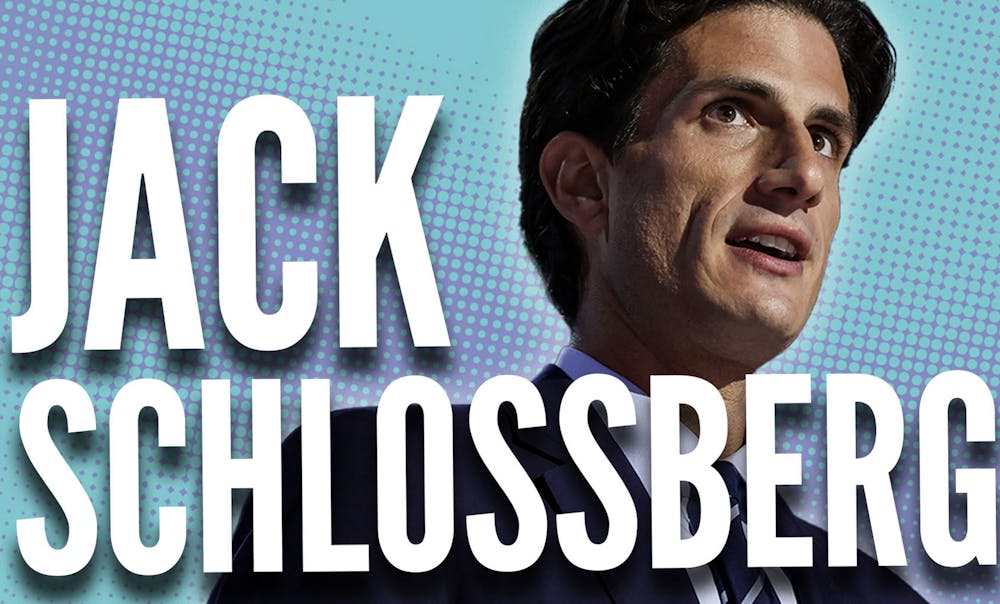When you picture an internet troll, I bet you don’t envision a Kennedy. Frankly, the two seem to be each other’s antithesis. Kennedys are sharp-featured, daring and Ivy League-educated New Englanders with a knack for politics. Trolls? Hardly.
However, Jack Schlossberg, John F. Kennedy’s only grandson, is both. In posts typically less than 25 words, he writes the unhinged, speaks the controversial and responds to the other side without fluff or fear. Because of this, his rhetoric is too sharp to be mistaken for another Democrat’s:
“DEI PERVERSION IS COSTING YOU MONEY,” an X post reads.
“I’m having a son!! So excited about this. Cannot wait for the birth of my next child because today was the best day of my life. Out of wedlock, yes. But we might get married,” he wrote on X, adding to a fictional narrative that he and Usha Vance, JD Vance’s wife, were planning on having a child.
At a time when most Democrat activist platforms are informative — but not mirroring Republicans’ sharpness — Schlossberg’s gutsiness thrives. Currently, he has over 1.5 million followers across X, Instagram and TikTok. Schlossberg has also been a political correspondent for Vogue since 2024. He is a growing force to be reckoned with.
Schlossberg’s trolling is random and sometimes extreme. It’s grown an audience with two prerogatives: young Gen Z viewers intrigued by a funny Kennedy-gone-troll or progressives looking for an ambitious force to be seen and heard by the far right. Because of this, he keeps catering to both.
In an interview with Jimmy Kimmel six months ago, Schlossberg agreed that his Instagram posts are a form of “public service.” He then explained his goal when creating.
“What I’m trying to do in my [TikTok] videos is to bring some levity and some humor to serious political issues,” he said. “My videos, maybe they’re a little crazy, but maybe they’re just crazy enough to work.”
Schlossberg is tired of misinformation and the current state of political discourse. So, he is redefining a new form of media content, bridging comedy and politics in a way hardly done before.
For example, he posted an edited screenshot to Instagram of Usha Vance’s Wikipedia page, claiming she was “the wife of Newark York Governor Jack Schlossberg.”
He could post long paragraphs of political nuance or current events, but he doesn’t. Instead, he relies on short posts that speak for themselves. He knows that the young internet would yawn at anything too serious or too long. Why not push the boundaries?
Simply, there are too few notable internet personalities with bold enough voices to do what he does. Progressive activist accounts spread awareness, and can be viral, but don’t captivate the right. Traditional meme accounts don’t lean into politics with the same edge. They are often too general and aim for an all-internet audience. Schlossberg uses a new form of political communication to argue, point with a critical eye and create a new audience.
In doing so, Schlossberg has reinforced the decades-old idea that being outlandish in media — regardless of content, character or controversy — will land a spotlight. Extreme right-wing media personalities from the past, like the late radio host Rush Limbaugh and conspiracy theorist Alex Jones, have had similar attention-grabbing abilities (with highly offensive commentary and incorrect, heinous judgments).
Unlike Jones or Limbaugh, Schlossberg’s trolling is satire, or a “bit,” not meant to seriously put down marginalized groups or to further political violence. (He has openly decried political violence: for example, when President Trump survived the 2024 assassination attempt in Butler.)
Simply, he’s creating his own internet audience via trolling. What does this mean for future political communication? I think Schlossberg is pioneering the way for more humor-political personalities to emerge. If a Kennedy being out-of-pocket creates shock, but ultimately an online demand for new-age political communication and satire, then others from more established political families may become savvy trolls.
The future of political trolling will have to rely on pushing the bounds of humor. Instead of posting long commentary or snappy fact checks, there’s a large potential for simple humor. Especially with AI-generated videos and photos on the rise, satirical content can expand the audience for politics. Posts will likely rely on Gen Z’s short attention spans, less on policy.
Redmond (Reddy) Bernhold is a junior studying biochemistry and journalism. He originally hails from Minster, Ohio but calls Siegfried Hall his home on campus. When not writing, he explores South Bend coffee shops and thrift stores. You can contact Reddy at rbernho2@nd.edu.










